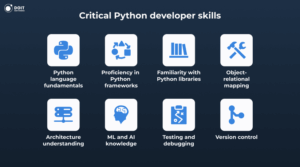Here’s the thing – not all Python developer skills and qualifications work for every project. In 2025, Python powers web apps, data analysis, automation systems, machine learning models, and cloud infrastructure.
So, when you hire your next Python developer, you’ll meet different skill sets, even when they have similar experience levels. The most important task here is to match the skills with your project’s needs.
In this article, you’ll find out the most in-demand Python developer skills with their simple breakdown by role requirements. By the end, you’ll know how to sort them into must-haves and project-specific ones, and know what’s right for your case. So, let’s get started!
Python developer skills refer to the practical abilities and technical knowledge required to build, test, and maintain software using the Python programming language.
Typically, it involves a strong grasp of Python syntax, familiarity with Python frameworks and libraries, database management, automated testing, and specialized skills relevant to the project at hand.
In practice, Python developer skills combine basic coding knowledge (which you can look for in almost every candidate) with more advanced, role-dependent expertise. Let’s take a further look.
Here are the foundational skills that appear in every Python developer job description:
Now, let’s look at the tools that support these basic Python developer skills:
Testing tools
unittest, pytest, doctest, Nose2, Tox
Type safety
mypy, Pyright, Pyre, typing module, Pydantic
Code linting/formatting
flake8, Pylint, Black, isort
Documentation
Sphinx, MkDocs, pdoc
Package managers
pip, Poetry, Conda
Environment management
virtualenv, pipenv, pyenv
Now, let’s outline Python developer skills that are not part of the core foundation but are frequently required in commercial projects. These skills are tied to specific responsibilities and vary depending on the role.
Below is the complete list of what to look for when the role demands more than basic scripting.
Here are the specialized tools and frameworks that experienced Python developers use regularly, depending on the project type:
Web frameworks
Django, Flask, FastAPI
ORM libraries
SQLAlchemy, Django ORM, Tortoise ORM
Async libraries
asyncio, aiohttp, Celery
DevOps tools
Docker, Kubernetes, Jenkins, GitHub Actions
Cloud services
AWS, Azure, Google Cloud
NoSQL databases
MongoDB, Redis, Cassandra
Big data tools
Apache Spark, Hadoop, Kafka
So, as you can see, all Python developers share common basics, but the specific skills depend entirely on their specialization.
Why does this matter for your hiring? You can’t just look for “Python programming language experience” and expect to find the right fit. You need to understand what each Python role does day-to-day and what tools they use to get there.
For example, Python skills for data science may include strong proficiency with pandas and NumPy, but not necessarily the ability to build an API. Python backend developer skills, in turn, often include web service design, but usually lack experience with data libraries.
So, what skills are required for different Python developer roles? Let’s break down.
Back-end developer
Develop server-side app logic and write back-end code
Django or Flask
Design and maintain APIs for communication between front-end and back-end systems
RESTful API development
Ensure the back-end is optimized and updated for performance and security
SQL and database design
Integrate and use web frameworks to build web services
ORM tools (SQLAlchemy, Django ORM)
Deploy apps and manage server or cloud environments
Data scientist/data analyst
Collect, clean, and collate data from various sources
Pandas and NumPy
Use Python math and utility libraries to perform statistical analysis
Matplotlib or Seaborn
Build statistical and predictive models for decision support
scikit-learn
Analyze and interpret complex datasets to extract meaningful insights
Jupyter Notebooks
SQL and data querying
Machine learning engineer
Design and implement ML algorithms and models
TensorFlow or PyTorch
Fine-tune, test, and evaluate model performance
scikit-learn
Utilize ML libraries and frameworks in experiments
ML workflow tools (Airflow, Kubeflow, MLflow)
Deploy ML models to production environments
Model serving (TensorFlow Serving, FastAPI)
Monitor model performance and retrain as needed
Feature engineering with Pandas
Automation engineer
Design and develop automation scripts
Selenium (browser automation)
Implement robotic process automation (RPA) using Python
BeautifulSoup or Scrapy (web scraping)
Automate IT tasks
Requests
Integrate with APIs to connect various services
OS and subprocess modules
Now that you are familiar with a list of basic and role-specific capabilities, let’s focus on the eight most in-demand Python developer skills in more detail. While we’ve already covered some of them earlier, this section will take a closer look at what each skill entails and how to evaluate it during interviews. Keep reading!

First up, a Python developer with solid fundamentals can explain the language’s core concepts, including:
During interviews, you can ask candidates to explain the difference between mutable and immutable types or describe when to use specific data structures. Competent Python developers can provide clear explanations to those questions without hesitation.
If you’re not familiar enough with Python to evaluate these concepts yourself, consider bringing in a senior engineer for the interview or using a hiring platform. This is where DOIT can help – we’ve already screened hundreds of candidates on these exact fundamentals, so you can get vetted Python developers in days without assessment overhead.
Now let’s talk about what often separates good Python developers from great ones – framework expertise.
Experienced Python developers are experts in at least one major framework. They understand not just how to use its features but when and why to apply them.
Framework knowledge speeds up development significantly because Python developers can use pre-built components instead of creating solutions from scratch.
Popular Python frameworks include:
When you evaluate framework skills for Python developer roles, ask candidates to describe projects they’ve built using them. Look for detailed explanations of why they chose particular frameworks and how they applied advanced features.
Python’s library ecosystem represents one of its greatest strengths. The Python Package Index (PyPI) contains over 660,759 projects as of mid-2025, giving developers pre-built solutions for almost any task.
The most popular libraries you can search for in Python developer skills are:
Python developers use libraries to solve everyday tasks without writing all the logic themselves. For example, they can process data, make API calls, handle files, and build ML models with ready-to-use tools.
Moving forward, database interaction represents a core requirement for Python full-stack developer skills. And ORMs provide the bridge between Python code and these database operations.
ORM proficiency means the developer can design database schemas using Python classes. They should know how to define relationships between models and write complex queries using the ORM’s query API. Also, they should understand when to use the ORM (for standard operations) and when to use raw SQL (for performance-critical queries).
The most popular ORMs you can find in Python developer requirements include:
Next, architecture skills refer to how Python developers organize and structure code to build maintainable apps. In practice, it covers designing how different system parts work together and how they can be modified without breaking other components.
Core Python architecture skills include:
Still, architecture skills aren’t a must-have for every candidate. For example, entry-level Python developer skills usually don’t require this knowledge. However, middle+ Python developers who work on features across multiple components benefit from understanding architecture principles.
According to the latest Python Developer Survey, Python is used almost equally for both web development and data-related tasks, 48% and 49% respectively.
This fact means machine learning and data analysis skills are now common in many Python developer roles, even outside of core data teams.
Of course, it doesn’t mean you need to hire data engineers for backend roles. But Python developers who understand ML workflows tend to be more adaptable in AI-enabled products.
For example, in web applications, they can help integrate recommendation engines or process structured data coming from ML APIs.
Now, let’s talk about testing and debugging as part of Python developer skills. These concepts involve writing automated tests to verify code works correctly and systematically identifying and fixing issues when they arise.
Quality-focused Python developers should write tests for their code and approach debugging methodically.
Look for Python engineer skills in:
During interviews, ask candidates to walk through how they’d debug a slow application or describe their testing strategy for a new feature. Strong Python developers can explain their systematic approach and discuss specific tools they’ve used to solve similar problems.
Finally, professional Python development requires effective collaboration through version control systems, especially Git.
Thus, skilled Python developers should know how to track and manage code changes using branching strategies and pull requests as standard parts of their workflow.
Strong programmers write clear commit messages and structure their changes for easy review. They’re comfortable with platforms like:
Typically, a Python developer’s GitHub profile can help you assess their approach to working with version control systems (e.g., how they store and update code, how they track changes). If they don’t have a profile, simply inquire about how they work with code in a team: ask how they create new branches or roll back errors.
Now you know which Python developer skills to look for and how to evaluate them during interviews. The next step? Combine their technical expertise with problem-solving abilities, communication skills, and cultural fit all in one candidate. Sounds tough, but there’s a solution.
Instead of conducting dozens of interviews, you can receive the first relevant CVs matched to your specific requirements within 5 business days. DOIT Software has spent over 10 years evaluating top Python developers for global businesses. Just drop a line, and dedicated talent matchers will help clarify the skills needed for your next Python hire.
Get a developer and start building your dream team ASAP.
Request CVsAs of mid-2025, companies are most often seeking Python developers with strong practical skills, including proficiency in working with Pandas, NumPy, SQL, and basic statistics, as well as experience building models in scikit-learn or PyTorch, and a basic understanding of data visualization.
In addition to technical skills, employers expect candidates to be able to write clean code and adhere to OOP principles. Automation skills have also become important, particularly using Python in conjunction with Apache Airflow, Docker, FastAPI, or cloud pipelines.
Every Python developer should master core syntax and object-oriented programming concepts. They need to understand database operations with SQL and know how to work with APIs. Also, they should be proficient with Git version control systems. They should possess solid debugging skills, experience with testing frameworks like pytest, and a basic understanding of HTML, CSS, and JavaScript.
Python skills for data science include proficiency with pandas and NumPy for data manipulation. Also, consider matplotlib and seaborn for data visualization, scikit-learn for machine learning implementation, and Jupyter notebooks for analysis workflows. Additionally, look for a statistical mindset, proficiency in SQL for database queries, and experience with big data tools.










